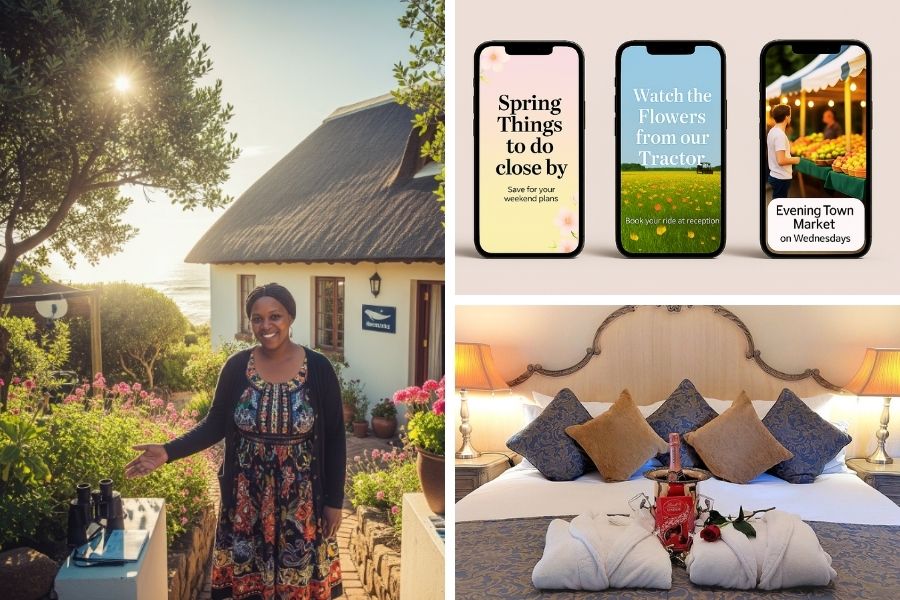Your sales funnel for accommodation bookings guides guests all the way from dreaming to your doorstep. Google calls this the 5 Stages of Travel — dreaming, planning, booking, experiencing, and sharing. Every guest, like Anna scrolling Instagram on a grey Tuesday, moves through these steps before choosing where to stay. She sees a spring getaway and thinks: I need that!
That’s the dreaming stage — where every booking begins. The question is: will Anna’s journey lead to your property, or someone else’s? A strong sales funnel for accommodation bookings, built around Google’s stages, guides her confidently from daydream to doorstep, so you can price and act with purpose instead of panic.

Stage 1: Dreaming — the start of your sales funnel for accommodation bookings.
Anna hasn’t chosen where to go yet. Beautiful photos, glowing reviews, and an updated Google profile plant seeds here. If your property is invisible at this stage, you won’t even make her shortlist.
How to catch her attention:
-
Use eye-catching, professional photos on your website and channels you are linked to. Show your best rooms, outdoor areas, and unique features. (Find out how to improve your content to improve your booking numbers)
-
Share stories and experiences on social media: highlight seasonal activities, special touches, and guest experiences. (See: Storytelling to win guests)
-
Encourage past guests to leave reviews on Google and online travel agents (OTAs). Authentic stories build trust. (Also read: How to make your guest reviews work harder for you).
-
Make sure your Google Business profile is complete and up to date with accurate amenities, photos, and contact info.
Quick takeaway: Building trust before guests enquire increases your chance of being shortlisted.
Stage 2: Planning — keep guests moving through your funnel.
Now Anna starts actively researching. She Googles “spring getaways near Cape Town” and compares multiple options. She looks for accurate information, availability, and clear pricing.
How to keep her engaged:
-
Keep your OTA listings and website content consistent — photos, descriptions, and rates should match.
-
Highlight unique experiences or seasonal events that make your property stand out.
-
Offer early booking perks or small incentives to encourage commitment without cutting prices. (Read about the secrets to success for marketing specials)
-
Provide clear, easy-to-find policies and FAQs — this reduces friction and increases trust.
-
Track which dates and room types are leading or lagging, and adjust marketing or messaging accordingly.
Quick takeaway: Be visible, consistent, and helpful. Nudge hesitant guests with small, targeted incentives rather than blanket discounts.
Stage 3: Booking — turning browsers into bookers.
Anna has narrowed her choice to you and two competitors. Now she decides where to book. This stage is where your pricing strategy and value propositions matter most.
How to guide her choice:
-
Peak dates filling fast? Hold or increase rates — demand is your ally.
-
Long weekends? Add minimum stays to prevent single-night gaps.
-
Empty shoulder nights? Offer value adds like late checkouts, free breakfast, or a discounted extra night instead of lowering rates.
-
Make booking easy: ensure your website’s booking engine is simple, mobile-friendly, and shows clear availability. (Read how to turn lookers into bookers on your website)
-
Send gentle reminders to guests who start but don’t complete bookings — a simple email or push notification can tip them toward completion.
-
Highlight social proof: show how many rooms are already booked or recent guest reviews to build urgency.
Quick takeaway: Monitor your funnel signals and respond strategically to convert enquiries into confirmed bookings.
Stage 4: Experiencing — delivering on your sales funnel’s promise.
Anna arrives and experiences your property first-hand. A smooth, memorable stay keeps the funnel flowing and encourages future bookings.
How to delight her:
-
Make check-in fast, friendly, and hassle-free. Consider self-check-in options if appropriate.
-
Match or exceed the photos and descriptions she saw online — consistency builds trust.
-
Add small touches: personalised notes, welcome snacks, or helpful local guides.
-
Train staff to notice guest preferences and respond proactively. A small gesture can make a big difference.
-
Encourage social sharing: signage in rooms or public areas can subtly invite guests to post their experiences online.
Quick takeaway: Deliver what you promise, then add memorable extras to turn first-time guests into repeat bookers.

Stage 5: Sharing — feeding back into your accommodation booking funnel.
After her stay, Anna leaves a glowing review and posts on social media. You’ve now entered the dreaming stage for her friends and followers.
How to keep the momentum going:
-
Reply promptly to reviews. Thank guests and highlight something specific about their stay. (Read more: Why guest reviews are important)
-
Encourage referrals or loyalty perks for repeat bookings. Offering promo codes as private special offers will make your guests feel special.
-
Share user-generated content on your social channels (with permission).
-
Send a follow-up email thanking guests, highlighting upcoming offers, or inviting them to book again directly. Closing the loop of your sales funnel ensures that today’s guest becomes tomorrow’s referral.
Quick takeaway: Every review and share feeds the start of a new guest journey. Nurture this stage to create ongoing visibility and trust.
Why it matters.
Mapping the guest journey as a funnel helps you:
-
Price with purpose instead of panic.
-
Track how fast weekends and rooms fill compared to last year.
-
Identify where enquiries stall and act to close the gap.
-
Use targeted value adds to move shoulder nights without discounting.
Paying weekly attention to your sales funnel for accommodation bookings gives you the confidence to price with purpose. And this confidence guides more Annas from dream to your doorstep, filling rooms at the right price and strengthening your bookings.
